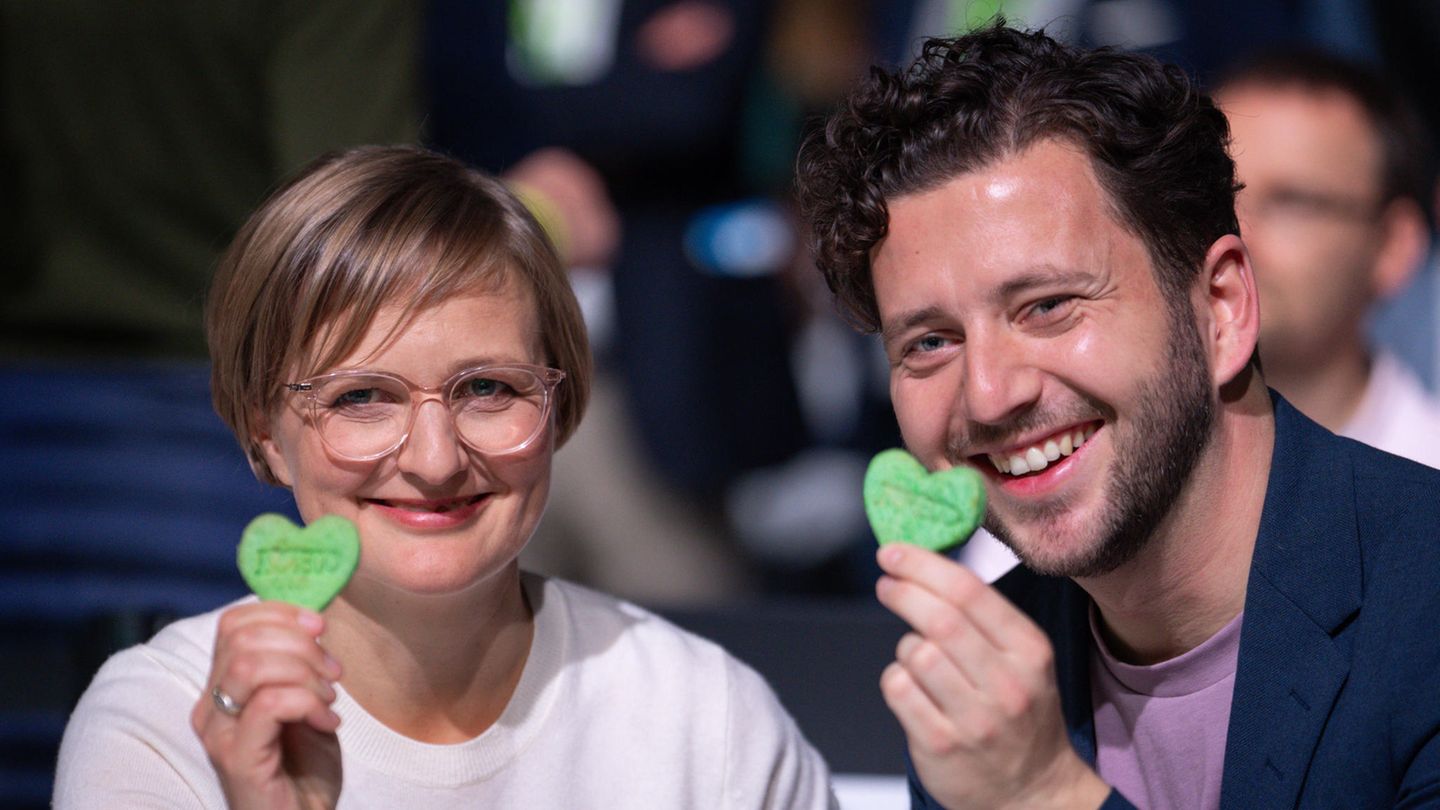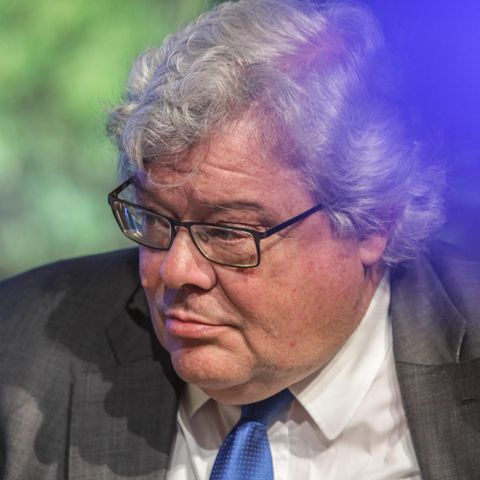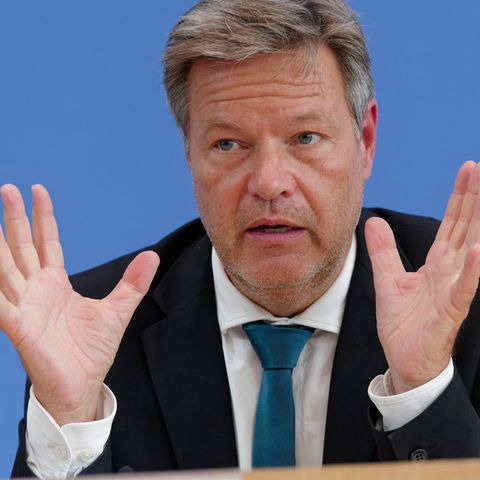Copy the current link
Traffic lights broken, party executive board gone, election defeats in a row – at their party conference, the Greens defiantly claim that they are “ready to start again”.
The Greens of the 90s would describe the Greens of today as their opponents, says the man who would like to become their party leader. Mathias Ilka, 59, wears a cap and a green hoodie with the warning that there is no Planet B. He can understand only too well why people think the Greens are “downright shit,” says the man who, of course, doesn’t end up becoming party leader . “It’s better to have an honest opposition than false, lying government participation,” he shouts. “Sorry I can’t join in the cheering chorus here today.”
Wait, cheering choir? With the Greens? The party is facing hurricane-force headwinds; its board recently folded after a series of election defeats. Oh, and the Berlin government coalition has just failed. There are enough good reasons for the Greens to be in a bad mood.
The opposite can be observed in the large congress hall in Wiesbaden. They even defiantly claim in writing on the large stage design that they are “ready to restart”. Of course, this has less to do with the situation and state of the party and much more to do with the time of the meeting. A new Bundestag will be elected in less than 100 days.
Greens put the dispute aside
The Greens want to take advantage of the opportunity and be the first party to prepare for the election campaign. So don’t argue so much about the past, but rather look forward, that’s the motto of most of the speeches that will be given this weekend. Ultimately, it is the Greens’ job to give the country a “future and orientation,” as Robert Habeck says.
Rally around the Flag is what the Americans call what’s happening here. The Greens are gathering around the flag, moving together, putting aside, at least for the moment, the worst internal party strife. More than 7,000 people have joined the party since the traffic light was broken. From Sunday, Habeck will carry the green flag as a “candidate for the people of the country,” as it is still printed in the application paper. But the day before, the Greens first elect a new party leadership.
“Phew,” says Felix Banaszak as he steps up to the lectern. For a moment it seems as if the Duisburg member of the Bundestag only realized at that moment what kind of adventure he had embarked on. Banaszak talks about fear, quoting the musician Rio Reiser, who once sang that we have “nothing to lose but our fear.”
It is a sentence that the Green cabinet members would probably not accept in this absolute way, but that does not challenge it. Fear has gripped large parts of society, says Banaszak. Fear of Putin, of Trump, of the next gas bill, of walking home in the dark. It’s no use countering this fear with statistics and arguments; what’s needed is empathy, listening, “and even hugging.” With 92 percent, the delegates ultimately elected him as their new party leader.
They even forgive Franziska Brantner for saying “Make Green great again” at the end of her application speech. After all, the woman from the Realo wing also says that life must be fair and social. “There is not the climate issue here and the social issue there.” The 78 percent with which she is elected co-leader is usually called an honest result at party conferences. Compared to the unrest that previously existed in parts of the Green Party, it is actually surprisingly good. The fact that a confidant of Habeck, who has expected a lot from his party as Vice Chancellor, is supposed to lead the party is not acceptable to everyone. Brantner is currently State Secretary in the Ministry of Economic Affairs.
Traffic lights off provides relief
So the two new guys are talking – and that’s supposed to be the turning point? At the end of September, the now previous party leader Omid Nouripour certified that the party was in the “deepest crisis” in a decade and therefore resigned along with Ricarda Lang. The problems have not magically disappeared since then: the fact that the Greens are met with rejection and even hatred, that acceptance of climate protection measures has suffered greatly, and that the party is virtually no longer present in East Germany. But that’s only marginally the issue in Wiesbaden.
Habeck himself provides an obvious explanation: “We might have started this party conference differently if the traffic lights hadn’t broken. We might have had debates about red lines,” says Habeck, about what to do with the FDP or with Christian Lindner under no circumstances should you do this at the traffic lights. “But there is no FDP and no Christian Lindner in the government anymore,” shouts Habeck, causing the hall to cheer.
It is the same relief that can currently be found in all previous traffic light parties. The unloved coalition, the eternal bickering, it’s finally over! Many in the Greens see it as an advantage to be able to start the election campaign with freedom, so their top man is not constantly in the dilemma of having to defend some lazy compromises at the same time.
Just what exactly they want to do differently and better in the Grün house, what the way out of the misery could look like – the best answers to this in Wiesbaden are provided by the woman who is given a tearful farewell here. She never wants to hear about an election defeat again on the evening, politics just needs to be explained better, says Ricarda Lang, who has had to do exactly that often enough. “What paternalistic shit is this,” she cries. The Greens don’t have to explain politics better, they have to do it better. “We are not the vacuum cleaner representatives of democracy!”
Why did Lang and Nouripour resign?
The enthusiasm in the room is so great that one inevitably asks oneself: Why did Lang and Nouripour resign again? Maybe you can see more clearly when the pressure is released. Maybe you just speak more freely when you step down. In any case, Lang is using her last major appearance for the time being to admonish her own people: “We Greens can mess with the middle as long as we are perceived as an elite project.” That’s why when it comes to climate protection, we need to talk a lot more about the costs, about who benefits from it, who has to pay – and what we have in store for those who lose out.
It is the thorn called the heating law that is still so deep in the green flesh today. At least the Greens are now ready to learn from the pain. From now on, climate protection and social justice should only be thought of together. Or as Green Foreign Minister Annalena Baerbock put it: “This feeling that we can no longer afford to live is the challenge of our time.”
What used to be true in the cinema or swimming pool, that some children said they couldn’t go there – “that applies today at the kebab stand,” says Baerbock. That is the challenge of the time that we have to tackle together. Baerbock talks about the rent cap, the minimum wage, and the Germany Ticket, which should not be made more expensive. “Facing these issues more intensively does not mean giving up on core issues,” says Baerbock.
“Why have we been knitting wool sweaters and scarves for 40 years?”
Neither the core issues nor the traditions, in this respect the Greens are almost conservative. It is the new party leader who recalls a very special green tradition at the end of her speech. “Why have we been knitting wool sweaters and scarves for 40 years?” asks Franziska Brantner. “The answer is: winter election campaign.”
But as it is with traditions: they are in danger everywhere. When a Green delegate entered the Wiesbaden congress center in the morning and opened her backpack to check, the security guard discovered a ball of wool. It is peppered with half a dozen knitting needles.
“Unfortunately they’re not allowed to take them in,” says the security guard. “Security reasons.”
The green one gasps.
The security guard remains firm. “Theoretically, you could put out my eye with it.”
Source: Stern
I have been working in the news industry for over 6 years, first as a reporter and now as an editor. I have covered politics extensively, and my work has appeared in major newspapers and online news outlets around the world. In addition to my writing, I also contribute regularly to 24 Hours World.






